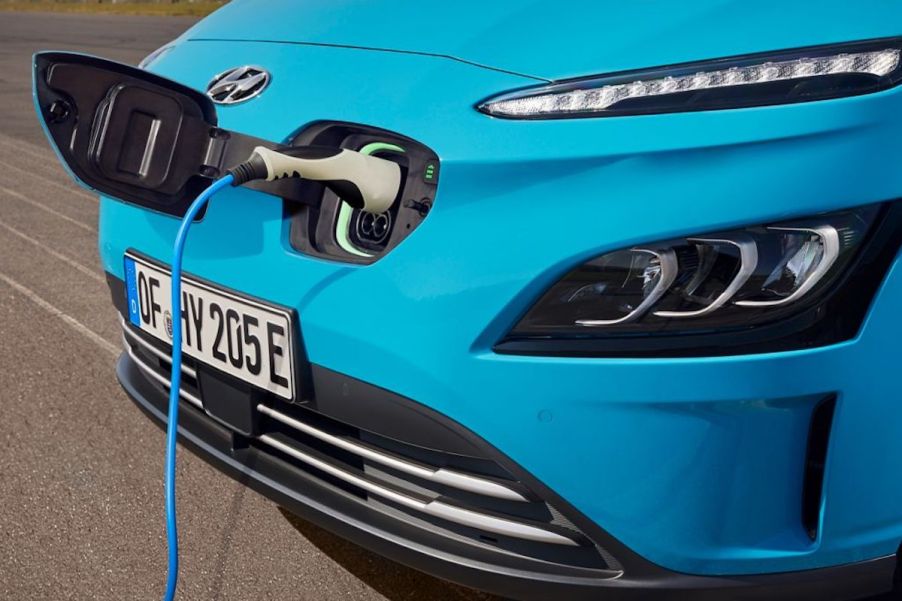
5 Electric Cars You Can Buy for Under $30,000 (After Applying the Tax Credit)
Electric cars have become popular in recent years, but many drivers still avoid EVs because of their hefty price tags. Consumers might also worry about electric vehicles’ costly batteries or higher insurance costs. However, EV ownership also cuts many other expenses. For instance, no more oil changes or dealing with skyrocketing gas prices.
Plus, plenty of electric vehicles are affordable because of EV tax credits. Here are the cheapest electric cars available, according to InsideEvs.
2022 Hyundai Kona Electric

After you get your EV tax credit, it’s as if you paid $26,500 instead of $34,000 for the Hyundai Kona Electric. According to Hyundai, the permanent-magnet synchronous motor gives the Kona Electric 201 hp and 291 lb-ft of torque. Drivers can enjoy a healthy 258 miles of range thanks to the 64-kWh battery pack.
And like the regular turbo-powered Kona, the electric model is fast and fun to handle. For the 2022 model, Hyundai installed new glass panels to reduce vibrations and other annoying noises common in compact vehicles.
Plus, the base trim comes with plenty of standard technology, and the backseats are roomier than the gas-powered Kona’s accommodations.
2022 Mazda MX-30
Mazda lists the base-model MX-30 for $33,470. But only drivers in California can take advantage of the EV tax credit, which brings its final price to $25,970. The MX-30 is Mazda’s first foray into the all-electric world, but this crossover falls short in several areas.
Though it exhibits the automaker’s signature fun-loving handling, the electric motor makes only 143 hp. And despite having a starting price similar to the Kona Electric, the MX-30’s range is only 100 miles, less than half of the Kona EV’s range. And even with the MX-30’s longer wheelbase, backseat passengers don’t get much legroom.
2022 Hyundai Ioniq Electric
Deducting the EV tax credit brings the Hyundai Ioniq Electric’s lowest possible price to $25,725. Without the maximum credit amount, Hyundai starts pricing the Ioniq Electric at $33,245. With only 134 hp on tap, this compact sedan doesn’t usually excel on the highway.
In addition, the Ioniq Electric’s range isn’t impressive at just 170 miles, but that’s more than enough for a commuter car. Critics also warn about this sedan’s shaky ride, so you’re better off keeping it within city limits.
Despite its flaws, the Hyundai Ioniq Electric is easy to steer and comes with a good selection of standard features.
2022 Mini Cooper Electric
Starting at $29,900, the Mini Cooper Electric is already one of the cheapest EVs. If you use the total amount of the tax credit, that knocks the price down to only $22,400. This electric Mini only has about 114 miles of range, but that’s fine for any commuter who needs a pintsize vehicle.
Plus, with 181 hp on tap, the Mini Cooper Electric is faster than several other compact cars (EV or otherwise). Mini is taking reservations for the latest model, estimated to be delivered this fall.
2022 Nissan Leaf
Nissan was one of the first automakers to offer an all-electric car, and the Leaf is cheaper than ever for 2022. With the $7,500 federal tax credit, you can lower the purchase price from $27,400 to only $19,990. Though that makes the Nissan Leaf your cheapest option, keep in mind that the standard battery only gets 149 miles of range.
The S Plus and SL Plus trims get 215 miles of range. The S Plus is probably the best value, retailing for just under $25,000 with the tax credit applied. The Nissan Leaf may not have the best interior in the segment, but it’s hard to beat that price.


